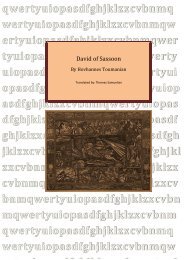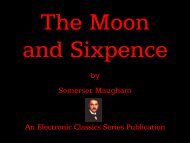Focus on Words
Focus on Words
Focus on Words
You also want an ePaper? Increase the reach of your titles
YUMPU automatically turns print PDFs into web optimized ePapers that Google loves.
every place where noisy skateboarders might c<strong>on</strong>gregate, develop city centres so that<br />
the energy and skills of young skateboarders become part of the positive landscape.<br />
This is “enabled” leisure.<br />
It was <strong>on</strong>ce argued that leisure is the weak link in the chain of socialisati<strong>on</strong>, when<br />
compared with family, school and work. Young people make the most of it in plenty of<br />
ways.<br />
Answer the questi<strong>on</strong>s.<br />
1. Do you agree that leisure speaks about the identity of young people?<br />
2. What is meant by these kinds of leasure?<br />
self-determined, intended, collective, individualised, enabled, solitary, obstructed,<br />
organized<br />
Presentati<strong>on</strong><br />
Literary Skills<br />
The literal meaning of a word you find in the dicti<strong>on</strong>ary is the denotati<strong>on</strong> of a<br />
word.<br />
But the words besides denoting a c<strong>on</strong>crete thing, acti<strong>on</strong> or c<strong>on</strong>cept may also have<br />
an emoti<strong>on</strong>al meaning, i.e. they may express the speaker’s attitude. This type of<br />
meaning is the c<strong>on</strong>notati<strong>on</strong> of a word,e.g. the words man and gentleman have similar<br />
denota ti<strong>on</strong> but the c<strong>on</strong>notati<strong>on</strong>s are different.<br />
The word gentleman means a man who is in some way more formal, more polite,<br />
has good manners.<br />
C<strong>on</strong>notative meaning comes from people’s experiences both pers<strong>on</strong>al and<br />
universal, e.g. for most of the people the significance of the word “home” is very pers<strong>on</strong>al<br />
and is different to different people, it might mean untidiness; lack of privacy to<br />
some; to the others it brings the feeling of love or security. Or good food and<br />
relaxati<strong>on</strong>.<br />
When you c<strong>on</strong>sider what words suggest, you form pictures and sense impressi<strong>on</strong>s<br />
in your imaginati<strong>on</strong>. Such pictures or sense impressi<strong>on</strong>s are called images. Through<br />
images, or imagery, writers present what can be seen, heard, touched, tasted, smelled<br />
or what can be felt inside (joy, pain, fear).<br />
The language which suggests new associati<strong>on</strong>s, emoti<strong>on</strong>s and is c<strong>on</strong>cise and bright<br />
is known as fi gurative language. Figurative language has c<strong>on</strong>notati<strong>on</strong>s and helps to<br />
express ideas more vividly, e.g.<br />
Figures of speech are the result of creativeness of our mind. Figures of speech do<br />
not change their meaning, but add emotiveness to the utterance.One of the most widely<br />
used figure of speech is metaphor.<br />
Metaphor is a trope in which a word or a phrase is associated with a particular<br />
c<strong>on</strong> cept or object <strong>on</strong> the principle of identificati<strong>on</strong>, e.g.<br />
The fog comes<br />
<strong>on</strong> little cat feet. It sits looking over<br />
harbor and city<br />
132
















